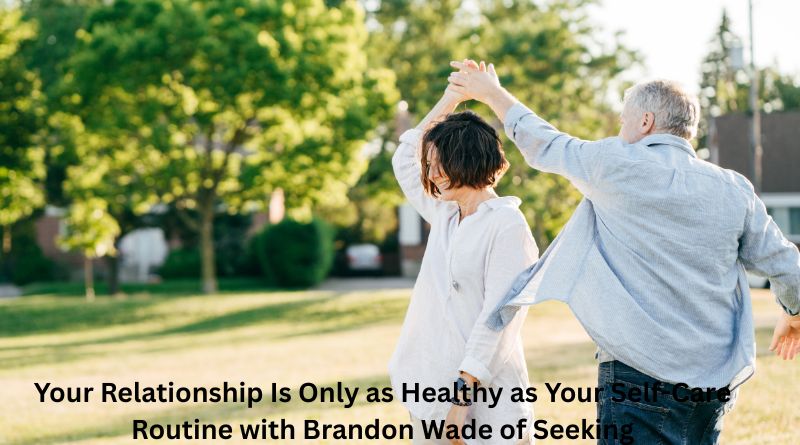Your Relationship Is Only as Healthy as Your Self-Care Routine with Brandon Wade of Seeking
In a dating culture that often glorifies chemistry and instant connection, the role of personal well-being can be easily overlooked. True compatibility isn’t just about spark, it’s about shared values, emotional maturity, and a commitment to growth. Site creators that recognize this shift are helping to redefine what meaningful connection really looks like. Brandon Wade, Seeking.com founder, an MIT graduate and visionary entrepreneur, created the platform to offer a space where relationships are not just about romance, but about building something real, rooted in the daily practices that support emotional resilience and personal clarity.
Self-care is essential, not just for personal well-being but also for the health of a relationship. When you take care of your body, mind, and emotions, you bring a more grounded version of yourself into the partnership. This leads to better communication, healthier boundaries, and deeper, more lasting intimacy.
Why Self-Care Should Come First
Dating while depleted or emotionally unwell tends to produce one of two outcomes: clinging to a connection to fill a void or pushing people away due to overwhelm. Neither of these patterns fosters authentic love. Self-care helps break that cycle. By tending to your own needs first, you build the internal stability required to be present for someone else. This doesn’t mean you have to be flawless or fully healed to be loved, but showing up with intention and self-respect changes the dynamic entirely.
Prioritizing one’s own well-being also models healthy relational behavior. It invites mutual respect and discourages codependent dynamics that can sabotage even the most promising connection. When each person takes responsibility for their emotional health, the relationship becomes a space for growth rather than rescue.
What Self-Care Actually Looks Like
Self-care is often mistaken for indulgence, but it’s really about consistency. It’s in your morning routine, your ability to set boundaries at work, and your willingness to say no to situations that drain you. It’s choosing to sleep instead of scrolling, to journal instead of suppress, to rest instead of overextend.
These choices may seem small, but they set the emotional tone you bring into every interaction, including your romantic life. When people neglect their care, they often look to their partners to regulate their mood or provide a sense of identity. That pressure creates strain. But when each partner is caring for themselves well, the relationship becomes a place of shared strength rather than one-sided emotional labor.
Self-Knowledge Strengthens Attraction
People who practice regular self-care tend to know who they are and what they want. This clarity reduces emotional confusion and deepens attraction. Knowing how to care for yourself creates a sense of confidence that’s rooted in authenticity, not performance. It makes you less reactive and more responsive.
It also means you’re more likely to advocate for what you need, rather than expecting your partner to guess or fix. This clarity is deeply attractive. When people show up aligned in both self-respect and purpose, meaningful connection becomes more accessible.
The Link Between Habits and Emotional Health
Small daily habits have a cumulative effect on your emotional well-being. A 10-minute meditation might not seem like much in the moment, but over time, it improves your ability to stay regulated during conflict. A consistent workout routine can shift your relationship with stress. Regular journaling can help you track emotional patterns that might otherwise go unnoticed. These practices build emotional intelligence, which is critical to navigating dating with care. They help you notice your triggers, communicate with clarity and recover from difficult conversations without shutting down.
Brandon Wade mentions, “Mental wellness isn’t just about individual growth, it’s the starting point for building a relationship that is honest, compassionate and lasting.” When you feel mentally strong, you’re more likely to stay connected through tough conversations, rather than avoiding them. You’re also more likely to extend compassion to yourself and your partner.
Self-Care as a Filter for Compatibility
Taking care of yourself also shifts who you’re attracted to. When you’re aligned internally, you’re less likely to be pulled toward relationships that thrive on chaos, emotional confusion or imbalance. You begin to look for partners who are equally invested in their growth.
This makes your standards clearer, not in a rigid way but in a way that reflects your understanding of what kind of partnership nourishes you. You stop settling for exciting but unstable connections. Instead, you look for those that feel steady, respectful and sustainable. Seeking.com invites users to lead with their values, to be upfront about what they want and to filter connections based on shared priorities, not surface-level appeal.
Relationships as a Mirror
Your relationship often reflects how well you are, or aren’t, taking care of yourself. If you’re running on fumes, your tolerance for tension shrinks, your patience shortens, and your willingness to communicate dissolves. But when you’re rested, nourished and connected to yourself, you bring more empathy into every conversation.
You’re more present, listen more fully, and show up not from scarcity but from security. This kind of presence allows relationships to deepen. It builds the trust and intimacy required to weather life’s stressors together without losing yourself in the process.
Investing in You Is Investing in Us
If you want your relationship to thrive, start with you. Fill your emotional tank before you try to pour into someone else’s. Learn how to regulate your nervous system. Build routines that restore you. Say no when you mean it, and yes only when it aligns with your values. These habits make you not just a more attractive partner, but a more intentional one.
Relationships built on mutual care and individual stability are the ones most likely to last. Brandon Wade’s Seeking.com is creating space for this kind of modern love, where ambition, clarity and emotional well-being are part of the standard, not the exception. When each person brings their best, most grounded self to the table, connection stops being a game of guessing and becomes something deeply human: safe, seen and sincere.




